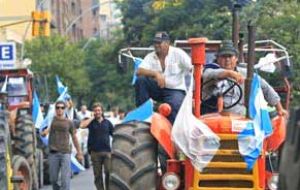MercoPress. South Atlantic News Agency
Argentina reluctant to accept a repeat of farmers' conflict
 Argentine farmers demonstrate again their demands
Argentine farmers demonstrate again their demands Argentine farmers' decision to resume protests against the government has put their demands back on the agenda but is unlikely to reignite the bitter conflict that gripped the country for four months.
Between March and July protests by farmers landed President Cristina Kirchner in a political crisis and saw investors ditch Argentine bonds and rush to swap pesos for dollars. Public support for farmers played a big role in the eventual defeat of the grains export tariff hike that sparked the protests in the world's No. 3 soy supplier. This time, things could be different. "Going back on strike is hard for people to understand, and in general there's opposition over a return to the conflict," said political analyst and pollster Ricardo Rouvier. "The (Argentine) government is in a weak position but it's still stronger than when the conflict ended (and) undoubtedly the farmers have less power and room for maneuver". Farmers on Friday started a six-day sales ban on livestock and export grains. A series of strikes disrupted the country's grains exports and forced soy-crushing plants to shut down as their soybean supplies dwindled. However, the new protest is unlikely to cause export delays at a time when crushers are well-stocked and trade volume is slack due to a sharp drought in farming areas and lower prices. "It's not the same as last time," said Patricia Bergero, an analyst at the grains exchange in Rosario, the country's soy hub. "The mills are more or less well-stocked now and the strike is for a short time". A downturn in global grain prices coupled with a devastating drought in the north of the country have fuelled farmers' gripes over milk prices, beef export curbs and export duties. They hoped the administration of President Cristina Kirchner would be humbled following its defeat over the duty hike but their demands have yielded little. "They've frozen us out" said Argentine Agricultural Federation head Eduardo Buzzi and one of the most charismatic farmers' leaders. But farmers have ruled out road-blocks and deny that the protest will stretch beyond Wednesday. "This time, the actors in this conflict are much more experienced (and) that means they'll be less aggressive and more rational," said Jorge Giacobbe, a political analyst. Although international prices have plunged 40% in the last three months while costs have risen, export duties remain too important to fiscal solvency to encourage the Argentine government to yield any ground. This was clearly shown by the September revenue figures: tax collection would never have risen 43% (to 24 billion Argentine pesos) against the previous year if export tariffs had not risen 147% (to four billion) in the same period. More over this confiscatory attitude towards agriculture is killing any chance of the Argentine's government target of achieving a 150-million-ton harvest by 2013. A harvest just short of 100 million tons is expected to fall 3% this season. The Kirchners administrations boast of farm exports having risen by 111% since 2000 but Brazil's have risen 191% and Chile's 252% in the same period.




Top Comments
Disclaimer & comment rulesCommenting for this story is now closed.
If you have a Facebook account, become a fan and comment on our Facebook Page!